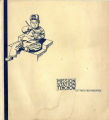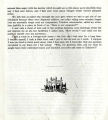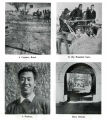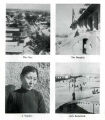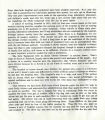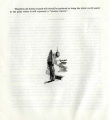| OCR Text |
Show Wasn't it a crime to be pulled by a human being for some cents which I would give him at the station? It certainly must be. And I was thankful that it was dark and nobody could see me, and I hoped for this poor fellow's sake that it would not be far. The station was crowded, and had I not had my new friends with me I certainly would never have reached the platform. But I was pushed and pulled and kicked, and today I am unable to reconstruct how it happened that I got a seat in the train which left for the south and which passed Tehchow in the late afternoon. It wasn't a very comfortable seat because I was pressed in between a Chinese woman and an old Chinese man who wore unusually thick garments, not very clean and rather smelly, and I didn't dare to move lest I should touch other people who filled the aisle. I tried to breathe superficially so as not to get too much of this thick, hot air in my lungs; and I looked out of the window so as not to see the dirty, poor-looking crowd packed in the car carrying their bedding and their children, pushed around by train officials, speaking not in a language but in sounds which hurt my ears, eating indefinable food, spitting on the floor, smoking little pipes and spitting more, leaning against one another trying to get a nap, and - this was perhaps the worst - looking at me and my companions. The train went fast; the landscape had no different appearance from and did not change a bit more than that which I had seen from the boat. Here the little huts formed small villages, no green gave life to the plain, only very few men or women could be seen working in their fields, and I wondered where the people of overpopulated China were. My only comfort was that we moved, that we did not crawl through this depressing country as we had the day before yesterday. Still the journey seemed endless; but we got to Tehchow. How often before had I looked up Tehchow in an atlas; and because it formed quite a black spot on a map, I thought I had good reason to expect a larger city. What I found was a place made up of the same huts, only bigger, and surrounded by a high wall which has a pagoda on one corner. The narrow streets were crowded with people who work, live, wash, shave, buy, sell, or whatever they might do on the street. Children -I think I have never seen so many children before - roll in the dirt together with the scabby dogs. It smelled of fish, spoiled vegetables, dirty water, and cholera. Rickshaws, donkeys, wheelbarrows of the strange Chinese sort, kept the streets busy; there was an awful noise and an awful dust; it was primitiveness and poverty in a most concentrated form. I had already made up my mind that I would take the first opportunity to leave - at least this part of the country - again; thus I didn't feel so depressed as before, and when we were welcomed in Tehchow by a sandstorm which blew the yellow sand in our eyes and mouths, and which made it almost impossible to see, I was rather more |

